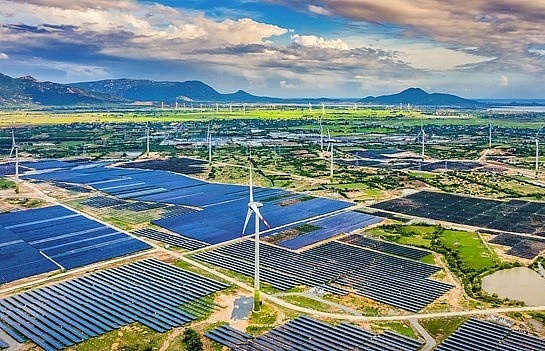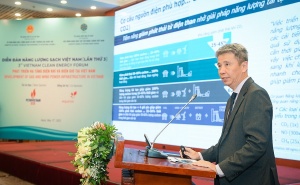Energy transition will not come without challenges
Globally, energy accounts for more than two-thirds of total greenhouse gas emissions. This makes the transformation of the energy sector centrally important in reducing emissions, and tackling the global climate crisis. Last year, investment in renewable energy reached approximately $500 billion, while the share of wind and solar energy reached a record 12 per cent of global electricity generation.
 |
| Ramla Khalidi - Resident representative United Nations Development Programme in Vietnam |
I take this opportunity to congratulate the Vietnamese government for the recent adoption of the long-awaited Power Development Plan VIII, which aims to achieve 10 GW offshore wind capacity by 2030, and reach a renewable energy target of 39.2 per cent by 2030.
The energy transition offers opportunities to accelerate the achievement of the UN’s Sustainable Development Goals, including the creation of decent jobs, the development of new technology and renewable energy industry sectors, and the attraction of green and quality investments.
At the same time, the energy transition does not come without challenges: it may increase the costs of energy in the short- and medium-terms, require large upfront investments, demand reskilling and retraining of the workforce, and disrupt the livelihoods of local people who are dependent on coal supply chains.
There is an urgent need to decouple economic growth from fossil fuel consumption, and at the same time, address these challenges to strike a balance between climate and development objectives, and ensure that the energy transition is just, equitable, and inclusive.
As we consider the important tradeoffs and policy choices ahead of us, allow me to share a few reflections. Firstly, as highlighted by UN Secretary-General António Guterres at the launch of the synthesis report of the Intergovernmental Panel on Climate Change in March, every country must be part of the solution in the fight against climate change. Demanding others move first only ensures humanity comes last.
Wealthier countries must keep their promise to provide $100 billion to support developing countries to build resilience. Developing countries need to accelerate the phaseout of coal, jumpstart the renewables revolution, and achieve net-zero by 2050.
Secondly, information and experience sharing, open dialogue, and cooperation among countries are essential for the just energy transition. Although the energy transition is specific to each country’s unique context, we all stand to gain from one another’s experiences and perspectives. Regular and open dialogue among countries on different points in the energy transition trajectory will enhance understanding, build trust and confidence, accelerate technology development, and promote innovation for a just energy transition.
Thirdly, climate and innovative finance – both domestic and foreign, and both private and public – is of paramount importance in the energy transition. Governments can create new advantages for private investment by putting in place forward-looking and transparent regulatory and pricing regimes, and through strategic public investments in essential infrastructure.
Many governments have created new institutions and facilities to increase the supply of long-term, domestic sources of financing. Financial sector reform and innovation need strong links to technology and industrial policy to develop national capabilities and avoid a situation in which the energy transition is constrained by the balance of payments.
Finally, the energy transition needs to be fair and equity-driven for developing countries to transition sustainably to low-carbon economies and establish climate-resilient trajectories, while realising their sustainable development objectives. The energy transition must be just and inclusive for workers, local communities, and affected people through creation of new economic opportunities, job creation and reskilling, capacity-building, and enhancing social safety nets.
 | $15.5 billion in financing for green energy from Just Energy Transition Partnership 2023 could be an interesting year for Vietnam’s energy sector, as $15.5 billion of financing is set to be mobilised for Vietnam’s green energy transition through a recent energy partnership. |
 | DPM requests clarity on renewable energy prices Deputy Prime Minister Tran Hong Ha requested that the Ministry of Industry and Trade (MoIT) amend regulations and offer specific instructions on the procedures for calculating and negotiating prices for transitional wind and solar power as soon as possible. |
 | Empowering Vietnam's energy transition Firming up intermittent renewables and addressing the challenges of a balanced supply across the country are some issues to tackle Vietnam's energy needs and sustainable development. Wei Nan Yew, regional general manager of GE Gas Power in South Asia Pacific & ANZ, discussed GE's role in supporting Vietnam’s energy transition and strengthening its grid infrastructure. |
What the stars mean:
★ Poor ★ ★ Promising ★★★ Good ★★★★ Very good ★★★★★ Exceptional
Related Contents
Latest News
More News
- Trung Nam-Sideros River consortium wins bid for LNG venture (January 30, 2026 | 11:16)
- Vietnam moves towards market-based fuel management with E10 rollout (January 30, 2026 | 11:10)
- Envision Energy, REE Group partner on 128MW wind projects (January 30, 2026 | 10:58)
- Vingroup consults on carbon credits for electric vehicle charging network (January 28, 2026 | 11:04)
- Bac Ai Pumped Storage Hydropower Plant to enter peak construction phase (January 27, 2026 | 08:00)
- ASEAN could scale up sustainable aviation fuel by 2050 (January 24, 2026 | 10:19)
- 64,000 hectares of sea allocated for offshore wind surveys (January 22, 2026 | 20:23)
- EVN secures financing for Quang Trach II LNG power plant (January 17, 2026 | 15:55)
- PC1 teams up with DENZAI on regional wind projects (January 16, 2026 | 21:18)
- Innovation and ESG practices drive green transition in the digital era (January 16, 2026 | 16:51)

 Tag:
Tag:




















 Mobile Version
Mobile Version